The B2B sales landscape in 2025 is more dynamic, data-saturated, and high-stakes than ever. From cold calls to executive presentations, every sales touchpoint generates a flood of digital interactions, yet most go underutilized. Despite decades of CRM and sales enablement innovation, too many sales teams still operate on lagging indicators, guesswork, and manual data entry.
That’s where AI-powered sales insight platforms come in. These tools do way more than organize activity. They analyze real-time customer interactions, sales performance metrics, and CRM datasets to surface truly actionable insights. Whether it's detecting churn risk, spotting a missing decision-maker, or guiding a next-best action, AI insight platforms help sales teams take the right action at the right moment.
That’s why we’ve created this comprehensive 2025 buyer’s guide to AI-powered sales insight platforms. Whether you’re evaluating tools for forecast accuracy, rep performance, or workflow automation, this guide breaks down the top solutions by functionality, team fit, and ROI potential.
From predictive analytics to Slack-based execution, we’ll help you identify the right platform to deliver real-time, data-driven insights that move deals forward.
What Are AI-Powered Sales Insight Platforms?
AI-powered sales insight platforms (also known as revenue intelligence platforms or AI sales assistants) use artificial intelligence to capture, interpret, and act on customer interaction data across calls, meetings, emails, and CRM updates.
Unlike legacy CRM tools, which simply store historical data, these platforms use generative AI and machine learning algorithms to extract meaningful, real-time insights from across your tech stack. From identifying buyer sentiment during a call to flagging pipeline risks, these tools surface context-aware, high-quality, data-driven insights that help sales teams make informed decisions faster.
[blue-section]
What they actually do:
- Convert calls and emails into real-time summaries, tasks, and Salesforce updates
- Alert sales reps and managers when a deal slips or a red flag is raised
- Use AI to score leads, evaluate pipeline health, and suggest next steps
- Trigger workflows across Slack, CRM, and outreach tools automatically
[/blue-section]
In short, these platforms bridge the gap between raw data and revenue-generating execution.
Modern Challenges in Sales Operations (Even with CRMs)
Even with modern CRM platforms like Salesforce or HubSpot, sales and RevOps teams still face serious friction points:
[blue-section]
- Repetitive tasks: Reps waste time logging activities, updating fields, and transcribing sales calls instead of closing deals.
- Incomplete customer data: Manual entry leads to inconsistent CRM records, causing gaps in the sales pipeline.
- Delayed action: By the time dashboards reflect an issue, it’s often too late to intervene.
- Siloed insights: Data lives in scattered tools (from sales engagement platforms to note-taking apps) preventing a unified view of the customer journey.
- Forecasting guesswork: Leaders still rely on gut instinct over real-time, ai-powered predictive analytics.
[/blue-section]
As a result, conversion rates stall, lead scoring lacks precision, and sales strategies become reactive rather than proactive.
What to Look for in an AI Sales Insight Platform
Here are six evaluation criteria every buyer should consider when choosing an AI-driven solution for actionable sales insights:
1. Automated Data Capture & Enrichment
What it should do:
Automatically capture customer interactions (calls, Zooms, emails, chats) and enrich CRM records with contextual details like key contacts, next steps, and competitor mentions.
----------
Why it matters:
High-quality datasets lead to high-value insights. Automation reduces manual tasks, improves CRM accuracy, and prevents critical data from falling through the cracks.
----------
What to avoid:
Platforms that still require rep intervention or miss key data sources like LinkedIn or third-party apps.
2. Predictive Analytics & Deal Scoring
What it should do:
Use machine learning to forecast pipeline outcomes, flag deal risks, and suggest where to focus.
----------
Why it matters:
Predictive insights help sales managers prioritize efforts and prevent revenue leakage. AI-generated deal scores and sentiment analysis enhance accuracy in decision-making.
----------
What to avoid:
Opaque algorithms that deliver “black box” scores with no context or explanation.
3. Real-Time Alerts and Guided Selling
What it should do:
Push real-time data-driven insights, like deal risks, champion turnover, or objection flags, directly into your team’s workflow via Slack or email.
----------
Why it matters:
This empowers reps and managers to respond instantly rather than reacting weeks later during QBRs. Real-time insights shorten the sales cycle and improve customer engagement.
----------
What to avoid:
Platforms that flood users with irrelevant alerts or require logging into a separate dashboard to act.
4. Workflow Integration & Automation
What it should do:
Integrate natively with your CRM platform (Salesforce, HubSpot), communication tools (Slack, Teams), and scheduling/email systems to automatically update records and trigger actions.
----------
Why it matters:
True AI-powered sales tools don’t just analyze data, they streamline workflows and orchestrate cross-functional tasks in real time.
----------
What to avoid:
Tools that operate in isolation, require manual data entry, or offer poor Slack/CRM sync.
5. AI-Assisted Communication
What it should do:
Generate call summaries, follow-up emails, stakeholder briefs, and even proposals, tailored to the customer interaction.
----------
Why it matters:
This eliminates repetitive tasks, improves messaging quality, and ensures every stakeholder is aligned with the latest updates from the sales team.
----------
What to avoid:
Poorly written AI-generated content or tools without approval workflows for reps to review before sending.
6. Security and Compliance
What it should do:
Offer enterprise-grade data governance with SOC 2 Type II, GDPR, and HIPAA compliance, while also providing control over what AI-generated content gets shared.
----------
Why it matters:
AI tools touch sensitive customer data and must meet strict data privacy standards. Accuracy, trust, and user controls are essential.
----------
What to avoid:
Vendors that use your customer data for training without consent or lack transparency in how AI models make decisions.
Top AI-Powered Platforms Providing Actionable Sales Insights (2025)
Not all platforms are built to deliver truly actionable insights. Some surface metrics. Others generate summaries. The best combine real-time data, automated workflows, and AI-powered decision-making to help sales teams act faster, coach smarter, and close with confidence.
Below, we break down the top platforms in 2025 that go beyond dashboards and help you execute with clear strengths, team fit, and feature analysis for each.
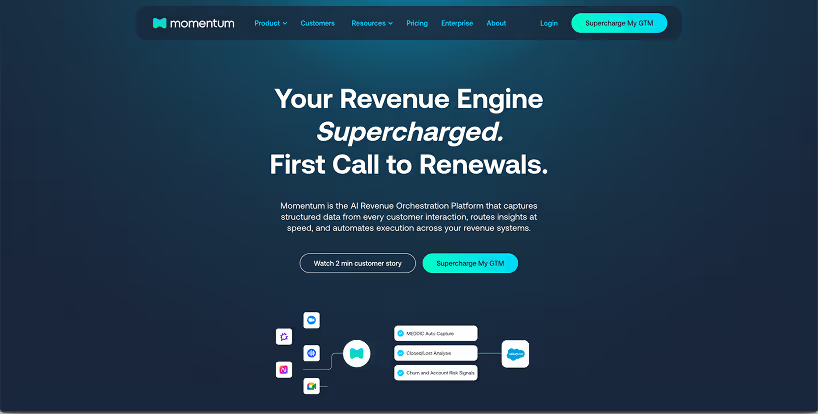
::autoboxgrid2
[LEFT]
Best for:: Revenue teams needing real-time data, AI-powered automation, and CRM-integrated workflows.
Pricing:: Enterprise-tier (custom quote, ROI-backed)
Key features:: AI-generated call summaries, tasks, and Salesforce updates. Slack-based workflows triggered by real-time sales signals. Deal, renewal, and risk detection agents powered by generative AI. CRM field auto-updates (MEDDIC, next steps, sentiment, objections). Weekly executive briefs and deal-room automation.
[RIGHT]
Strengths:: Built for action, not just analysis: AI agents don’t just surface insights — they trigger automations. Deep integration with Salesforce, HubSpot, Slack, Zoom, and Snowflake. Saves reps hours per week by automating follow-ups, notes, and updates. Enhances collaboration via Slack with live deal rooms and AI briefings.
Considerations:: Best results require process adoption (Slack rooms, AI workflows). Strategic platform, not just a point tool. Value increases with usage and stack integration.
Momentum helps sales reps, RevOps teams, and marketing leaders streamline workflows, surface real-time insights, and eliminate repetitive tasks, giving your entire tech stack an AI-powered orchestration layer.
::endautoboxgrid2
2. Gong
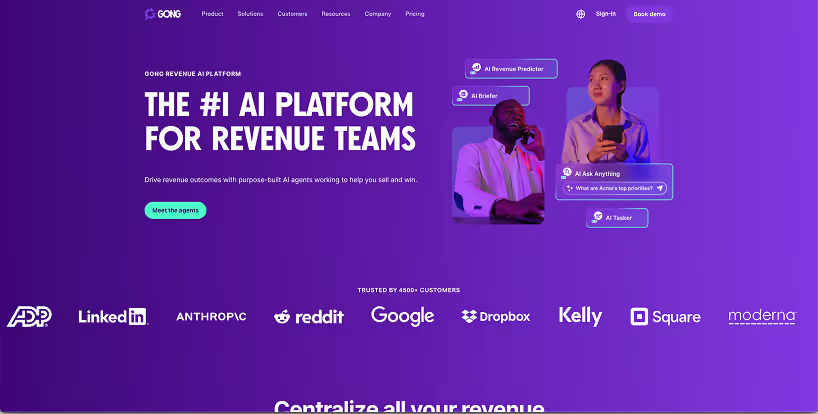
::autoboxgrid2
[LEFT]
Best for:: Sales orgs focused on call quality, messaging, and conversation analysis
Pricing:: Enterprise-grade (quote-based)
Key features:: Conversation intelligence with sentiment analysis and keyword tracking. AI-based coaching suggestions (e.g. talk time, objection handling). Pipeline deal health scores and engagement trend alerts. CRM and Slack integration.
[RIGHT]
Strengths:: Best-in-class voice and video analytics. High-quality insights into customer interactions and sales calls. Reps improve performance using data-driven coaching.
Considerations:: Heavy focus on spoken conversation data, less utility for email-driven teams. Requires training to align insights with actionable workflows.
For teams where the voice of the customer is central, Gong helps make informed decisions from every interaction.
::endautoboxgrid2
3. Clari
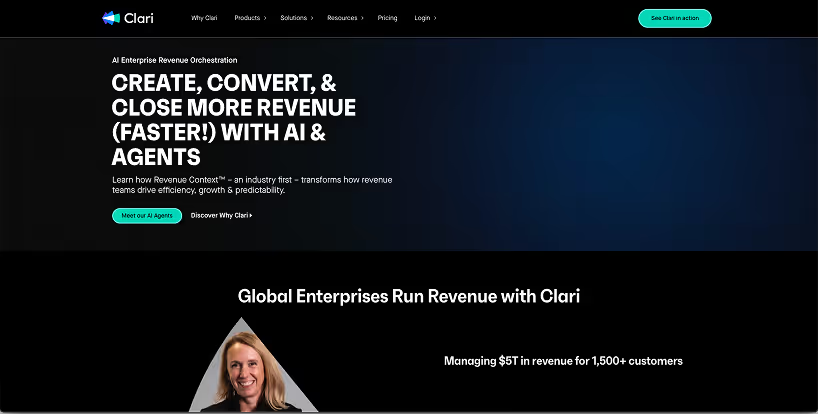
::autoboxgrid2
[LEFT]
Best for:: Revenue leaders needing precise sales forecasting and pipeline risk analysis
Pricing:: High (enterprise-level)
Key features:: Predictive analytics and deal scoring across the pipeline. Forecasting cockpit for sales managers and CROs. Alerts for stalled deals or missed next steps. Executive dashboards with trend analysis and win-rate metrics.
[RIGHT]
Strengths:: Excellent for sales strategy and revenue planning. Boosts forecasting accuracy using machine learning. Identifies risk signals early in the sales cycle.
Considerations:: Doesn’t cover conversation intelligence natively (requires pairing with tools like Gong). Complex implementation if CRM data quality is poor.
Clari is ideal for turning historical data into forward-looking, actionable insights for executive-level decision-making.
::endautoboxgrid2
4. People.ai
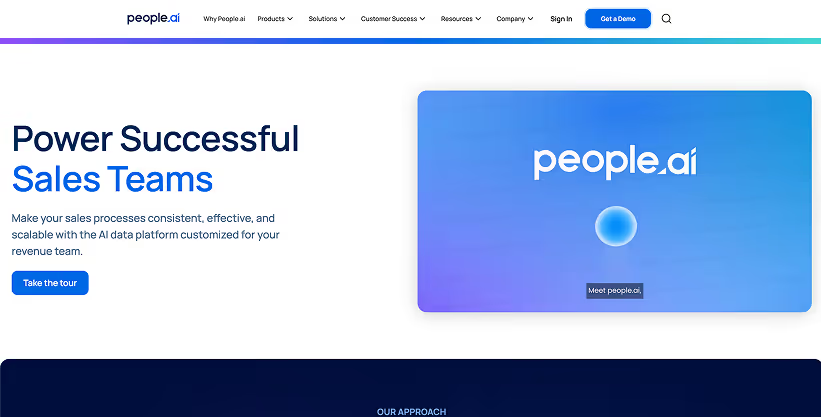
::autoboxgrid2
[LEFT]
Best for:: Teams that want to automate CRM data entry and benchmark sales activity
Pricing:: Enterprise-tier (quote-based)
Key features:: AI-powered data capture across emails, meetings, and calls. Activity benchmarking and rep performance dashboards. Lead scoring and deal risk alerts. Opportunity health analysis and buyer group mapping.
[RIGHT]
Strengths:: Great for improving CRM hygiene and reducing manual tasks. Shows which sales strategies correlate with closed-won outcomes. Strong for coaching and revenue intelligence.
Considerations:: Insight depth depends on completeness of captured datasets. Larger deployment investment than lightweight tools.
People.ai is especially strong for data analytics, scalable coaching, and understanding what activities drive conversion rates.
::endautoboxgrid2
5. Outreach
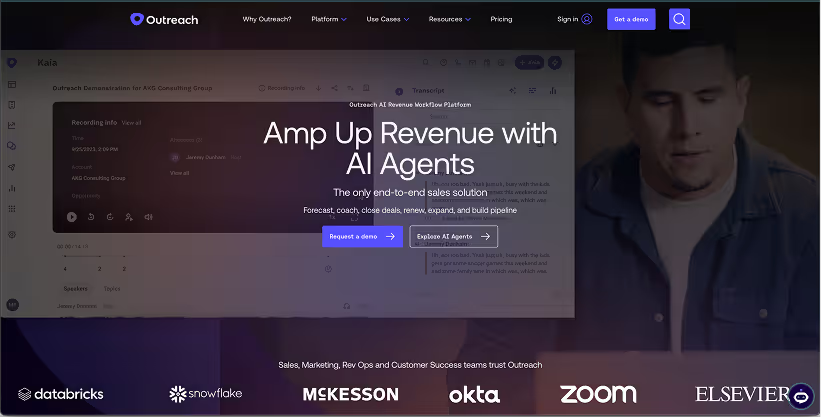
::autoboxgrid2
[LEFT]
Best for:: Outbound sales teams needing scalable engagement workflows and AI optimization
Pricing:: Premium (starting ~$120/user/month)
Key features:: Multi-channel sequences (email, LinkedIn, phone). AI-optimized timing and message delivery. Call recording with real-time prompts via Outreach Kaia. Basic deal health insights.
[RIGHT]
Strengths:: Streamlines high-volume lead generation and follow-ups. Improves engagement with AI-driven content timing. Great for sales reps managing large books of business.
Considerations:: Less robust for deep forecasting or coaching. Requires strong content and sequence strategy.
Outreach is a favorite for GTM teams that need to automate outreach, track engagement metrics, and use AI to optimize touchpoints.
::endautoboxgrid2
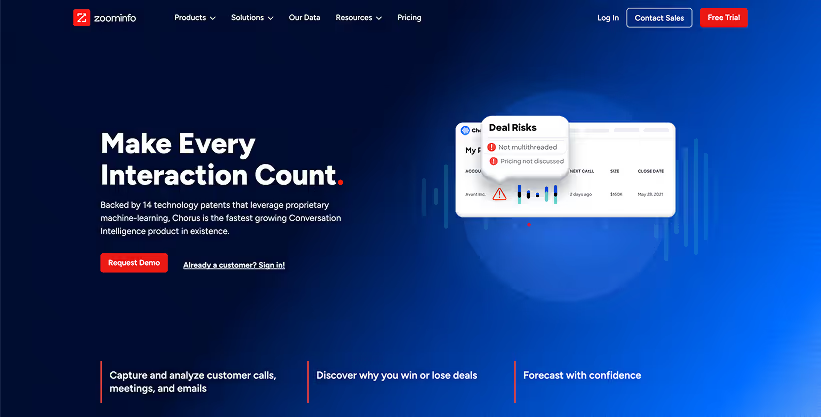
::autoboxgrid2
[LEFT]
Best for:: Teams wanting integrated prospect data and conversation analysis
Pricing:: Bundled with ZoomInfo SalesOS
Key features:: Conversation intelligence via Chorus (call summaries, sentiment). Buyer intent signals from external sources. Contact enrichment and org chart visibility. CRM auto-updates and Slack alerts.
[RIGHT]
Strengths:: Combines internal call data with external market trends. Great for aligning marketing automation with sales plays. Helps reps personalize messaging with context-rich data.
Considerations:: Call insights less advanced than Gong’s. May require buying into the broader ZoomInfo ecosystem.
ZoomInfo + Chorus helps unify sales data and social media signals into a single actionable view of the customer.
::endautoboxgrid2
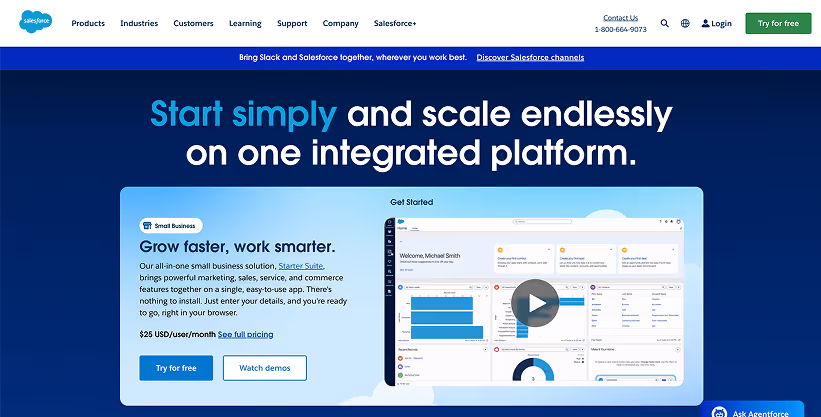
::autoboxgrid2
[LEFT]
Best for:: Salesforce-native teams wanting embedded AI within the CRM platform
Pricing:: Add-on to existing Salesforce plans (starting ~$50/user/month)
Key features:: Opportunity and lead scoring using predictive analytics. Generative content assistant (email drafts, updates). CRM activity capture and alerts.
[RIGHT]
Strengths:: Seamless integration within Salesforce ecosystem. Useful for teams that want low-friction AI functionality.
Considerations:: Insight depth limited compared to specialized tools. Effectiveness depends on CRM data quality.
Einstein is a low-friction way to use AI inside Salesforce, good for teams that need better insights without adding new tools.
::endautoboxgrid2
8. HubSpot Sales Hub (with AI Assistant)
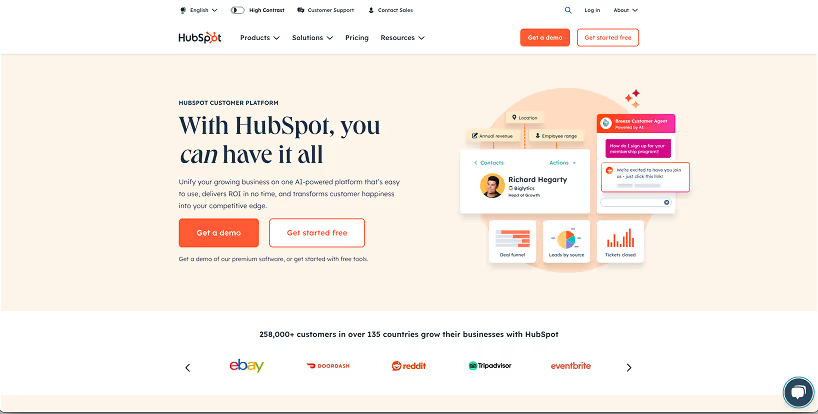
::autoboxgrid2
[LEFT]
Best for:: Mid-sized teams looking for user-friendly AI inside a Smart CRM
Pricing:: Bundled in Professional/Enterprise tiers
Key features:: AI-generated content, follow-up prompts, and summaries. Lead scoring and deal health indicators. Unified customer journey view.
[RIGHT]
Strengths:: All-in-one simplicity with crm platform, marketing, and sales insights. Strong UX and rapid onboarding.
Considerations:: Less customizable for advanced RevOps workflows. Requires higher-tier licenses for full AI suite.
HubSpot makes it easy to deliver actionable insights without overwhelming your sales professionals or your budget.
::endautoboxgrid2
9. Microsoft Dynamics 365 Copilot
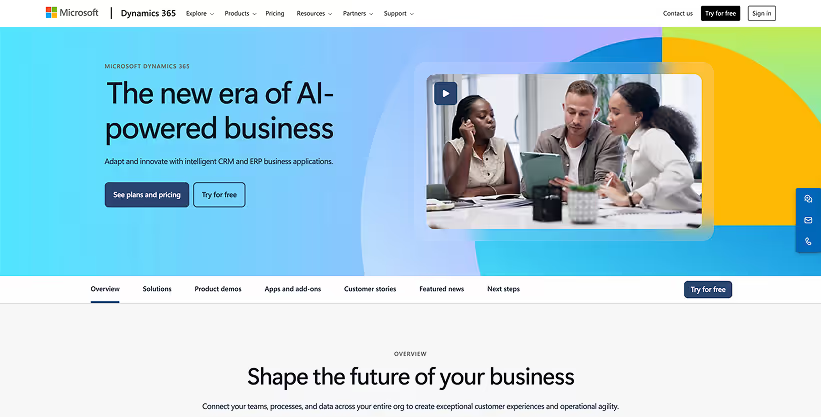
::autoboxgrid2
[LEFT]
Best for:: Organizations using Microsoft Teams, Outlook, and Dynamics CRM
Pricing:: Dynamics 365 + Copilot add-on (varies)
Key features:: AI-generated meeting summaries and email drafts. Contextual task generation after customer interactions. Outlook/Teams sync.
[RIGHT]
Strengths:: Native Microsoft integration and user-friendly interface. Supports embedded workflows across Microsoft stack.
Considerations:: Still maturing compared to more seasoned AI platforms. Limited outside the Microsoft ecosystem.
Copilot helps internal sales teams streamline manual tasks, especially for companies entrenched in Microsoft infrastructure.
::endautoboxgrid2
Comparison Table: AI Sales Insight Platforms at a Glance
::autotable
::columns=5
Platform
Best For
Key Features
Strengths
Ideal Team Fit
Momentum
AI-powered revenue orchestration and automation
Real-time alerts, Slack workflows, CRM updates, AI agents, call summaries
Turns insights into actions automatically, surfaces deal risk instantly
RevOps and SalesOps leaders focused on velocity
Gong
Deep conversation intelligence and rep coaching
Sentiment analysis, talk ratio metrics, AI-generated coaching, call summaries
Best-in-class call analysis and sales rep enablement
Inside sales and enablement-heavy organizations
Clari
Enterprise-scale sales forecasting and pipeline health
Predictive analytics, pipeline scoring, executive dashboards, forecasting cockpit
Improves forecast accuracy and pipeline inspection across large datasets
CROs and sales execs managing complex GTM motions
People.ai
CRM data enrichment and activity visibility
Automated data capture, lead scoring, performance insights, engagement mapping
Powerful CRM hygiene and scalable sales coaching
Enterprises with long sales cycles and account-based models
Outreach
High-velocity outbound and follow-up automation
Multi-channel sequences, email timing optimization, call guidance, deal insights
Optimizes top-of-funnel outreach and messaging effectiveness
SDR/BDR and outbound sales engagement teams
ZoomInfo (Chorus)
Data + call insight unification
Conversation AI, intent data alerts, contact enrichment, real-time CRM updates
Combines lead generation, conversation insights, and market trends
Full-funnel GTM teams wanting unified datasets
Salesforce Einstein
Embedded AI within Salesforce CRM
Lead/opportunity scoring, activity alerts, content assistant
Native to Salesforce, good for automated tasks inside existing CRM platform
Teams deeply invested in Salesforce
HubSpot Sales Hub
Simple, all-in-one Smart CRM with AI
Lead scoring, call summaries, AI email assistant, chat queries
Easy to use, combines sales + marketing automation + AI
SMB to mid-size teams wanting full-stack efficiency
Microsoft Copilot
Microsoft-first orgs using Outlook and Teams
Meeting briefs, task suggestions, follow-ups synced across Dynamics, Outlook, Teams
Embedded AI for internal collaboration and manual tasks reduction
Internal sales teams standardized on Microsoft
::endautotable
Momentum, Your Revenue Orchestration Advantage
Most AI-powered tools stop at insights. Momentum doesn’t.
Momentum is built to close the gap between data analysis and real-world execution. Instead of sitting on insights, it routes them into real-time workflows. Instead of relying on reps to act, it acts for them. It’s not a replacement for your CRM or call recording platform. It’s an orchestration layer that makes every system in your tech stack smarter and faster.
Momentum helps you:
[white-section]
- Automate post-call workflows: AI-generated summaries, next steps, objections, and competitor mentions are automatically logged to Salesforce or HubSpot, no more manual tasks or delayed updates.
- Trigger Slack-based deal workflows: From deal desk approvals to customer satisfaction alerts, Momentum surfaces key moments from customer interactions where they matter most.
- Detect risk, churn, and slippage early: AI agents scan live meetings and emails for signals and trigger action, like nudging reps to schedule a next meeting or alerting a CSM when a customer signals frustration.
- Summarize what matters for leadership: Sales leaders get weekly AI briefs, no digging through dashboards. Just actionable insights drawn from real-time data, across hundreds of conversations.
- Eliminate redundant tools: Momentum integrates with Gong, Salesforce, Slack, Zoom, and more, replacing fragmented point solutions with a unified AI assistant across the sales cycle.
[/white-section]
Momentum is designed for RevOps, sales professionals, and marketing teams who are tired of reactive dashboards and want proactive execution. It’s how you optimize every rep’s time, unify every customer data source, and drive revenue growth with precision.
Ready to See Momentum in Action?
Whether you're drowning in datasets or just tired of chasing reps for updates, it’s time to upgrade how your team operates.
Momentum brings together:
[white-section]
- AI-powered insights
- Workflow automation
- Slack-native alerts
- CRM-enriched customer behavior intelligence
- Action-triggering algorithms
- And most importantly — revenue-driving outcomes
[/white-section]
GTM teams from leading companies such as Ramp, Owner and 1Password already use Momentum to boost sales performance, streamline outreach, and make data-driven decisions in the moment.
Want to see how it fits your sales process?
[blue-section]
Book a demo and experience Momentum’s AI orchestration in action, customized for your pipeline, your CRM platform, and your goals.
Let the AI handle the repetitive tasks.Let your team handle closing deals.
[/blue-section]



.svg)


